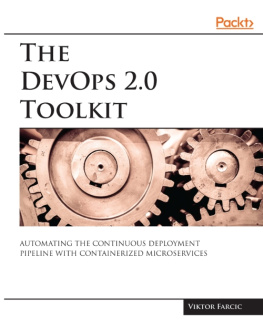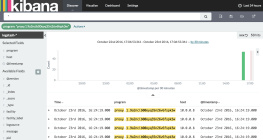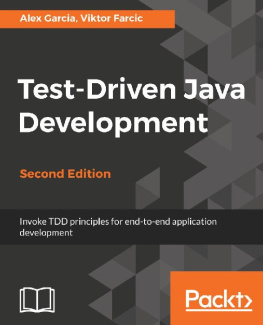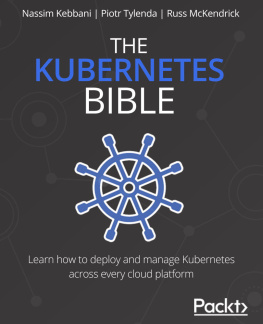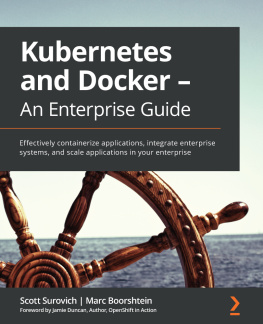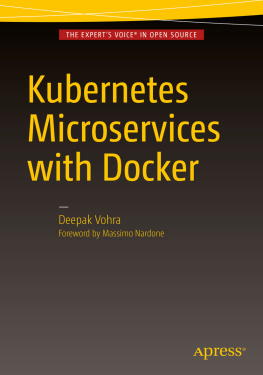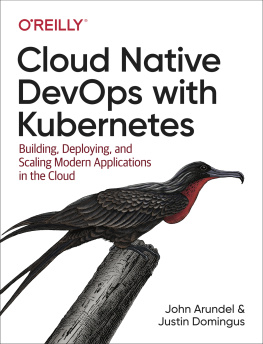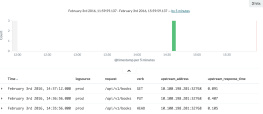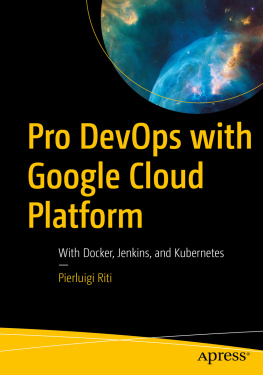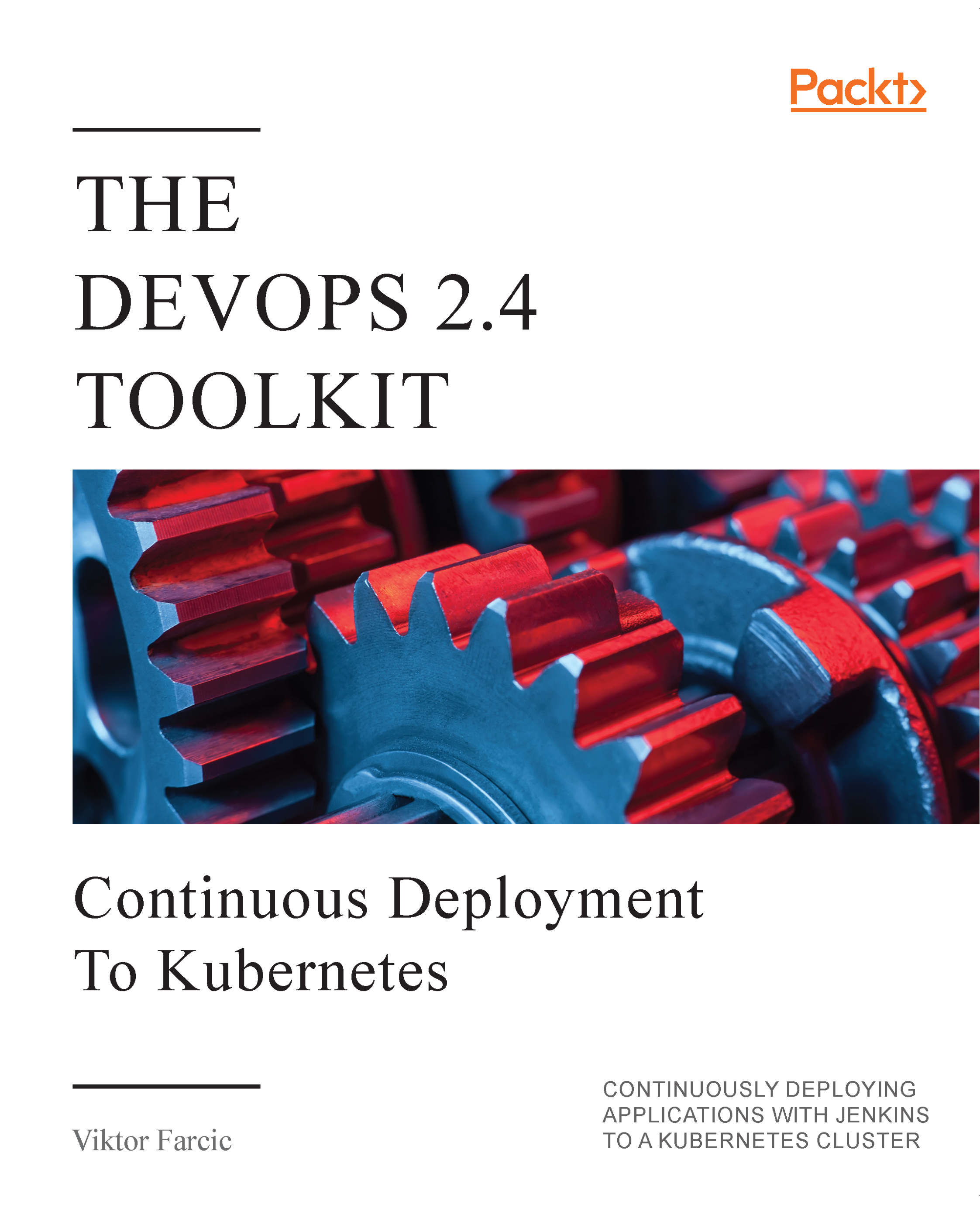
The DevOps 2.4 Toolkit
Continuous Deployment to Kubernetes: Continuously deploying applications with Jenkins to a Kubernetes cluster
Viktor Farcic

BIRMINGHAM - MUMBAI
The DevOps 2.4 Toolkit
Copyright 2019 Viktor Farcic
All rights reserved. No part of this book may be reproduced, stored in a retrieval system, or transmitted in any form or by any means, without the prior written permission of the publisher, except in the case of brief quotations embedded in critical articles or reviews.
Every effort has been made in the preparation of this book to ensure the accuracy of the information presented. However, the information contained in this book is sold without warranty, either express or implied. Neither the author, nor Packt Publishing or its dealers and distributors, will be held liable for any damages caused or alleged to have been caused directly or indirectly by this book.
Packt Publishing has endeavored to provide trademark information about all of the companies and products mentioned in this book by the appropriate use of capitals. However, Packt Publishing cannot guarantee the accuracy of this information.
Acquisition Editor: Dominic Shakeshaft
Technical Editor: Aniket Shetty
Indexer: Tejal Daruwale Soni
Production Designer: Sandip Tadge
First published: November 2019
Production reference: 1261119
Published by Packt Publishing Ltd.
Livery Place
35 Livery Street
Birmingham
B3 2PB, UK.
ISBN 978-1-83864-354-6
www.packt.com
Packt.com
Subscribe to our online digital library for full access to over 7,000 books and videos, as well as industry leading tools to help you plan your personal development and advance your career. For more information, please visit our website.
Why subscribe?
Spend less time learning and more time coding with practical eBooks and Videos from over 4,000 industry professionals
Improve your learning with Skill Plans built especially for you
Get a free eBook or video every month
Fully searchable for easy access to vital information
Copy and paste, print, and bookmark content
Did you know that Packt offers eBook versions of every book published, with PDF and ePub files available? You can upgrade to the eBook version at www.packt.com and as a print book customer, you are entitled to a discount on the eBook copy. Get in touch with us at customercare@packtpub.com for more details.
At www.packt.com , you can also read a collection of free technical articles, sign up for a range of free newsletters, and receive exclusive discounts and offers on Packt books and eBooks.
To Sara and Eva.
Viktor Farcic
Contributor
About the author
Viktor Farcic is a Principal Consultant at CloudBees (https://www.cloudbees.com/), a member of the Docker Captains (https://www.docker.com/community/captains) group, and author.
He coded using a plethora of languages starting with Pascal (yes, he is old), Basic (before it got Visual prefix), ASP (before it got .Net suffix), C, C++, Perl, Python, ASP.Net, Visual Basic, C#, JavaScript, Java, Scala, and so on. He never worked with Fortran. His current favorite is Go.
His big passions are containers, distributed systems, microservices, continuous delivery and deployment (CD) and test-driven development (TDD).
He often speaks at community gatherings and conferences.
He wrote The DevOps Toolkit Series (https://www.devopstoolkitseries.com/), and Test-Driven Java Development (https://www.packtpub.com/application-development/test-driven-java-development).
His random thoughts and tutorials can be found in his blog TechnologyConversations.com (https://technologyconversations.com/).
Preface
Soon after I started working on The DevOps 2.3 Toolkit: Kubernetes (https://amzn.to/2GvzDjy), I realized that a single book could only scratch the surface. Kubernetes is vast, and no single book can envelop even all the core components. If we add community projects, the scope becomes even more extensive. Then we need to include hosting vendors and different ways to set up and manage Kubernetes. That would inevitably lead us to third-party solutions like OpenShift, Rancher, and DockerEE, to name a few. It doesn't end there. We'd need to explore other types of community and third-party additions like those related to networking and storage. And don't forget the processes like, for example, continuous delivery and deployment. All those things could not be explored in a single book so The DevOps 2.3 Toolkit: Kubernetes ended up being an introduction to Kubernetes. It can serve as the base for exploring everything else.
The moment I published the last chapter of The DevOps 2.3 Toolkit: Kubernetes, I started working on the next material. A lot of ideas and tryouts came out of it. It took me a while until the subject and the form of the forthcoming book materialized. After a lot of consultation with the readers of the previous book, the decision was made to explore continuous delivery and deployment processes in a Kubernetes cluster. The high-level scope of the book you are reading right now was born.
Overview
Just like the other books I wrote, this one does not have a fixed scope. I did not start with an index. I didn't write a summary of each chapter in an attempt to define the scope. I do not do such things. There is only a high-level goal to explore continuous delivery and deployment inside Kubernetes clusters. What I did do, though, was to set a few guidelines.
The first guideline is that all the examples will be tested on all major Kubernetes platforms. Well, that might be a bit far-fetched. I'm aware that any sentence that mentions "all" together with "Kubernetes" is bound to be incorrect. New platforms are popping out like mushrooms after rain. Still, what I can certainly do is to choose a few of the most commonly used ones.
Minikube and Docker for Mac or Windows should undoubtedly be there for those who prefer to "play" with Docker locally.
AWS is the biggest hosting provider so Kubernetes Operations (kops) must be included as well.
Since it would be silly to cover only un-managed cloud, I had to include managed Kubernetes clusters as well. Google Kubernetes Engine (GKE) is the obvious choice. It is the most stable and features rich managed Kubernetes solution. Adding GKE to the mix means that Azure Container Service (AKS) and Amazon's Elastic Container Service (EKS) should be included as well so that we can have the "big trio" of the hosting vendors that offer managed Kubernetes. Unfortunately, even though AKS is available, it is, at this moment (June 2018), still too unstable and it's missing a lot of features. So, I'm forced to scale down from the trio to the GKE and EKS duo as representatives of managed Kubernetes we'll explore.
Next page

